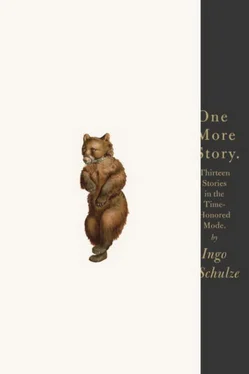“And what does that mean?” Mr. Neitherkorn asked, tracing his lips with the tip of his finger.
“‘Well, what’s a man to do, it’s fate’—fate, destiny, something like that. When I left the shop a half hour later — six dollars including a shave — three barbers offered a farewell handshake, and a fourth, who was having a cigarette outside, said: ‘Shchastlivo,’ sort of ‘Have a nice day.’”
“And that’s why you want to write about it?” Mr. Neitherkorn was propping his forehead between his palms.
“It was pure chance. I could have chosen another word just as well,” I replied. “But when somebody says that right to my face, and in Russian besides? Why should I come up with something on my own?”
“But if you’re going to claim that there is no such thing as fate?” He looked up, and I could see the reddish rims of his eyes.
“I meant that I don’t use the word myself. And besides,” I added, happy that I could now put the sentence to good use, “besides, the only important issue is why we believe there is or isn’t such a thing as fate.”
Mr. Neitherkorn crunched down on the last bit of sugar and took a sip without lifting his elbows from the table.
“So the only important issue,” I said, disappointed by Mr. Neitherkorn’s reaction, “is why we use the term.”
“If that’s how you see it,” he said. His tongue was playing with his dentures again.
Every day around one thirty in the afternoon, weekends included, Mr. Neitherkorn would arrive at the apartment. I always heard his key in the door, quickly followed by a key in the two locks to the adjoining room. Then it fell quiet, until he entered the kitchen around four o’clock, made coffee, and waited for me to join him. Usually the cotton plugs were still in his ears — he never went out on the street without them. He supplied the coffee, I bought the milk. If I didn’t show up by five, he would knock on my door. If I was going out for the afternoon, Mr. Neitherkorn liked to be informed — he just wanted to know I was all right.
At first I had acquiesced. But then it became a habit and finally an effort, or simply a drawback of the apartment that justified the rent: $289 for 275 square feet on the seventeenth floor on the Upper West Side — there was nothing cheaper anywhere in Manhattan. And he was gone again by six.
I had found my way to Mr. Neitherkorn by a series of unusual accidents. His wife, also a German, had died early that year. He was now living in an old folks’ home on West End Avenue and dropped by just to organize “final matters”—or that’s how the friend who led me to Mr. Neitherkorn had put it.
I read the article on “Fate” in the Brockhaus lexicon in the library of the Goethe Haus: “A term for the experience that much of what happens to a human being or in the world at large and in history is not the result of human will and action, but is imposed ‘from outside.’ Fate can thus appear as the decree of numinous powers, as ‘law,’ as the will of God, or in its secular form as something determined for a person by biological, social, or psychological factors.” There in black and white was everything you needed to know.
Grimms’ Dictionary offers numerous examples of the use of the word, for instance by Goethe: “Fate, before whose wisdom I stand in great awe, may — given the accidentality by which it works — wield a very clumsy apparatus.” This sentence was the answer to all questions, including those that had vexed me as a schoolboy: Why is the historical mission of the working class legitimate, and why must the working class be led by a new kind of party? Because fate accidentally wields a clumsy apparatus.
There are two pages on fate in Hoffmeister’s Philosophical Dictionary . The first page uses as its point of reference the work of a fellow named Gehl, who in 1939 published a book entitled The Germanic Belief in Fate , in which he explains why among Germans fate is necessarily imbued with a heroic character, and concludes: “What lies concealed behind this is nothing less than the proud belief in the utter freedom of man in the face of every sort of coercion, a belief arising from the depths of the German heart and finding its unflinchingly venerated culmination in a death approached with a smile.”
One should likewise consult Gehl as regards the merger of a personal belief in fate with a mystical, suprapersonal sense of “a common fate of all living creatures.” This is followed by a few bibliographical references and the next article: “Fatuousness.”
“Did you strike it rich?” Mr. Neitherkorn asked. “Have you discovered what fate is?” He rummaged in his shopping bag.
“In the Western world ‘fate’ is conceived of as either passive or active,” I attempted to summarize. “‘Passive’ means there is a point of origin, and after that events unroll more or less according to plan. If you regard it as more active, it functions generatively. You tough life out and hope you won’t get sick. If your own life is more or less determined by outside factors, you assume fate is running the show. Fate is a secularized version of God. You don’t want him to be in charge anymore. Left on your own, however, you feel overburdened. Even if I had found a dissertation on the correct usage of the word ‘fate,’ it wouldn’t have got me much further.”
“There’s definitely a study of that sort,” Mr. Neitherkorn said as he sat down.
“Sure,” I said. “But aren’t stories better than treatises?”
“You evidently don’t have a very philosophical turn of mind, do you?” he asked, cutting the carrot cake in half, including the plastic wrap.
“Philosophy’s never been my thing,” I replied. “That level of abstraction always allows you to assert the exact opposite. Evil — that’s what abstractions are; fate — that’s other people.”
Mr. Neitherkorn looked up. “Is that original with you?” He shoved me half the carrot cake and took a bite of his piece.
“It quickly becomes anything you want it to be,” I said. “Fate — that’s Oedipus; fate — that’s my language; fate — that’s my comrades or my genes. Man’s fate is man. I am fate. Fate — that’s vodka or 7Up or our carrot cake here. It always works, if you don’t apply it too clumsily, or maybe when you do. We should simply say, this and that happened. Why talk about fate?”
“People in fact use the concept of fate,” Mr. Neitherkorn responded, “at the point when they don’t understand what forces are playing games with us.” He looked at the carrot cake he’d been nibbling and cleared his throat.
“Do you know what I don’t understand? Why you’re here.” He ran a fingertip across his lips again and stared at his cup. That’s an odd question to hear from your landlord.
“I’ve got a scholarship,” I said.
“I know that,” he said. “But why did you apply for it? Why do you write your stories here and not in Germany, when ultimately they’re about Germany? Why have you left your wife alone for six months, with a monthly fax and telephone bill of six hundred dollars, spending your summer sitting in front of an air conditioner, in a city where a person can’t even get a good night’s sleep? I don’t get it.”
“Don’t you like being here?” I asked.
“Not in the least,” he said and suddenly sat up straight as a ramrod in his chair. “What would make you think that?”
Sunday. I’ve just received a fax.
“If a writer is going to meditate on fate, somebody should be reading Job softly in the background, the ‘story of a simple man.’ I had just run across a sentence for you while I was reading it this morning and wondering whether to get up and send it off to you, when the doorbell rang, around eight. Job was at the door, your Gypsy. His wife and child are in the hospital in Romania, he needs money. He’d already heard that you’re not here but in America. I had 180 marks on me, so I gave him a towel to wash up with, made him breakfast, and then we headed for the bank. I took out four hundred. Why not more? He’s learned that pleading beggar’s look well, kisses my hand, thanks God. For what? For fifty more to bring the kids a little something. And for his father? I still had thirty left, and I held on to it. All the while I was thinking how it’s no wonder bicycles disappear, and that it’s not just contrary to convention but to nature itself to be alone. And this old house seemed a huge luxury to me. I turned taciturn and unfriendly, Job still running through my mind. I couldn’t deal with very basic reality.
Читать дальше












